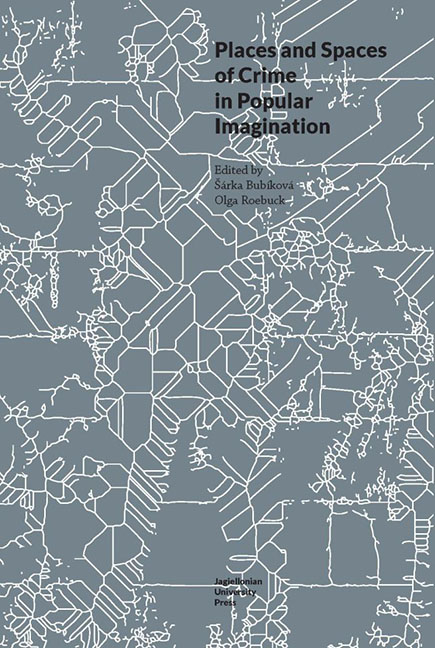Book contents
- Frontmatter
- Contents
- Introduction
- London in the Cormoran Strike Series
- London as the Murderer’s Playground in Sharon Bolton’s Now You See Me
- Through the Looking-Glass: Space and Place in Simon Mawer’s The Girl Who Fell from the Sky
- Murderous Academics: Territoriality in Cynthia Kuhn’s Academic Mysteries
- Suburbia and the Subversion of Its Values in 1950s Crime Comics
- Wilderness in Dana Stabenow’s and Nevada Barr’s Crime Fiction Series
- “I Am the Wave that Sinks into the Ocean”: The Sense of Place in The Affair
- Index
- Notes on the Contributors
Through the Looking-Glass: Space and Place in Simon Mawer’s The Girl Who Fell from the Sky
Published online by Cambridge University Press: 13 October 2023
- Frontmatter
- Contents
- Introduction
- London in the Cormoran Strike Series
- London as the Murderer’s Playground in Sharon Bolton’s Now You See Me
- Through the Looking-Glass: Space and Place in Simon Mawer’s The Girl Who Fell from the Sky
- Murderous Academics: Territoriality in Cynthia Kuhn’s Academic Mysteries
- Suburbia and the Subversion of Its Values in 1950s Crime Comics
- Wilderness in Dana Stabenow’s and Nevada Barr’s Crime Fiction Series
- “I Am the Wave that Sinks into the Ocean”: The Sense of Place in The Affair
- Index
- Notes on the Contributors
Summary
In spite of consistently favourable reviews of his novels, it was only with his eighth novel, The Glass Room (2009), that Simon Mawer achieved a breakthrough into the realm of novelists popular not only with critics and scholars, but also the general literary public. The novel was shortlisted for the Booker Prize (The Booker Prizes 2016) and turned Mawer, who had had a reputation “as a quiet stylist, a writers’ writer” (Crown 2009), into a commercially successful novelist whose works inspire film adaptations. In his impeccably researched novels, Mawer proves to be a sharpeyed observer of historical details, which highlight the authenticity of his narration. His novels comfortably inhabit place and time, partly because of the apt figurativeness of his poetic expression, often demonstrated by the employment of fitting parallelisms. His novels are known for a skilful blending of fact and fiction, the effect of which Mawer even accentuates by openly acknowledging the role of his own personal experience in the choice of his subject matter.
It is rather challenging to situate Mawer within the contemporary literary canon. The most appropriate category seems to be historical fiction, and yet he rejects the label as he does not consider himself to be a historical novelist at all (Flood 2016). What seems to be an inherent quality of his writing, as well as a vital aspect of classification, is the role of the settings of his novels. The settings do not only plausibly evoke the time and place of the story, they also complement their thematic focus and echo the workings of the protagonists’ minds. What is more, Mawer sets his novels in places and times of radical historical transformation, which inspires spellbinding plots in addition to affecting the protagonists, whose existence suffers an abrupt change. Mawer, whose favoured protagonists are women, documents the mutual influence of space and his protagonists and the process of transition by highlighting their hybrid or liminal qualities, exemplified by their frequent bilingualism, among other traits. All of the above-mentioned tendencies and qualities enable Mawer to closely inspect identity and its formation by means of his novels.
- Type
- Chapter
- Information
- Places and Spaces of Crime in Popular Imagination , pp. 47 - 62Publisher: Jagiellonian University PressPrint publication year: 2021



